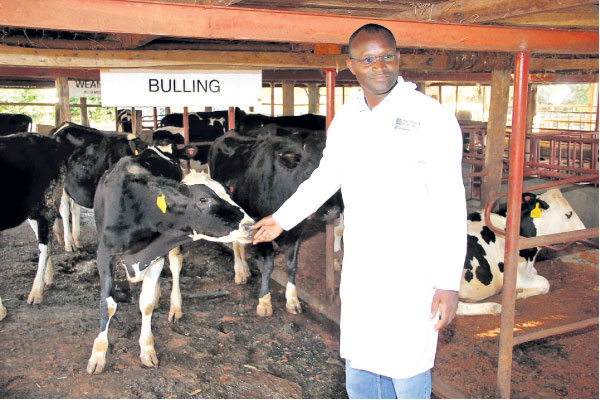
Best farmers in Kenya: The 15-acre farm in Kaplelach, Eldoret, is a sight to behold. Its lush green crops that include maize and beans are among the things that make the owner Paul Ruto stand out among his peers.
Named De Eden Farm, Ruto’s farm extends to a small swamp that had dried and he reclaimed it in 2006 by planting indigenous trees around the spot.
He later dug a well that he credits for the lush green crops on his farm, despite the dry spell. However, while Ruto is an accomplished crop farmer. The farmer has over 100 sheep and goats and 60 Friesian cows, 14 of which produce organic milk.
He describes the milk as organic because of the feeds he gives his animals and how he rears them. “I use organic methods to grow the animal feeds. I feed them on fodder, which is free from chemical substances.”
According to Ruto, organic livestock products are new in the country. “Conventional milk may contain residues of pesticides and other harmful chemicals from fertiliser, which are absorbed into the body through the feeds.
Organic milk is free of any chemicals.” He learnt about the method of farming and the milk in Holland in 2006. “I joined a farmers’ association called Share People, where we shared ideas and knowledge through exchange programmes organised by the embassy. This took me to Holland.”
In Holland, recounts the farmer, people take organic milk to prevent lifestyle diseases. He was inspired by this philosophy and when he returned home, he started to implement it.
Organic production of milk starts with growing feeds.
The fodder on his farm includes napier grass, calliandra, disodium, lucerne, sweet potatoes and banana in different ratios.
“I do not use any artificial fertiliser to grow the crops. I use manure from the cows to grow the fodder or sometimes I grow it without manure.”
Once they grow, he harvests the forage, cuts into pieces and mixes it in different ratios depending on animals’ needs.
“I later bury it for six months as silage or bind it as hay. This silage can feed my animals continuously for two years,” he says as he points at a mound of fodder on his farm.
Ruto gets about 400 litres of milk from the 14 cows every day. Of the milk, he sells 20 litres to a foreigner living in the area at Sh60 a litre. He further sells 100 litres of the organic milk to neighbours at Sh40.
The rest of the milk he delivers to a processor in the region.
“The processor and neighbours buy at normal rates. Most people do not know or appreciate organic milk. That is why if you want to sell at higher prices, they will not buy.” In Holland, he notes, a litre of organic milk goes at between Sh80 and Sh100 equivalent.
Ruto has divided the animal houses into several parts. These are the bulling section, which hosts eight heifers of between 12 to 14 months.
Then there is in-calf and steamers sections and the last one is a calf dormitory, complete with cubicles each containing single-decked bed for calves.
“Calves are delicate; they can’t sleep on cement floor because they can easily contract pneumonia. All 24 calves are female and have names that include Stella, Winny and Chela.”
The calves, according to Ruto, know their names. The farmer buys semen, which guarantees better female Friesian calves, from Holland.
“When I accidentally get a bull, I give it as an incentive to one of my 17 workers. I have a list that I follow. This is to help them become farmers,” the father of two says.
He has set collective targets based on average milk production per cow for his workers and he rewards them if they surpass the goals.
“Besides the health benefits, organic milk production is safe and cheaper because you do not use any commercial feeds, as most large-scale farmers do. And the fact that I do not use any fertiliser to grow my fodder reduces costs.”
Everything on his farm, including fodder and water, is put into good use.
“Water is pumped into the animal’s feeding troughs early morning. After they drink, the remaining is drained and used to wash the cow pens. This is repeated three times a day.”
The sludge, which comprises of water and animal waste, is then drained into a biogas cell tank. The gas produced is channelled to his kitchen for domestic use.
The excess biogas is piped to a one-piston engine that is modified to use 80 per cent gas and 20 per cent fuel to run a generator that produces electricity for lighting, milking and driving other farm machines.
How you can make extra money from urban spinach farming in Kenya
Before he ventured into farming, Ruto harvested maize for neighbours, burned charcoal and drove tractors for a living.
“Two women and a man have been instrumental in my life: Irene Mureithi, who motivated me to start business, and Ziporah Kittony for making me venture into farming. I also thank Luka Kimaru. The three are the reason I bought the 15 acres land.” Besides farming, Ruto is an astute businessman, who runs a real estate firm.






Nice! Into the business but meat. I need to exchange ideas too.
Nice work. I will love to invest in farming also, how can i get to his farm
I like farming,have got few sheep an I’m planning for Dairy rearing too,what steps should I follow in.
Nice piece Congratulations I wish one day to be a dairy farmer
It’s a really motivational story
It also eye opener, money can be gotten even at home as long as you produce value…
Persistence is key…get skills…apply ..get specialized…and also help others
I like that venture and wish one day to come for benchmarking
Big up bro am glad to bump into this
Comments are closed.